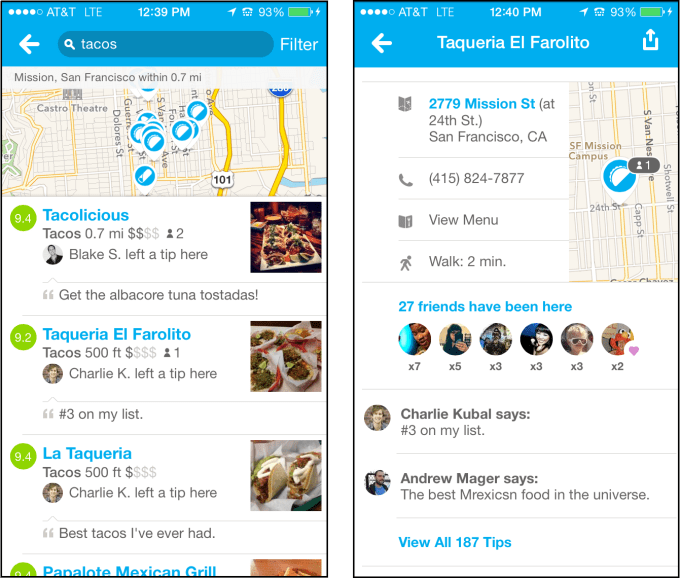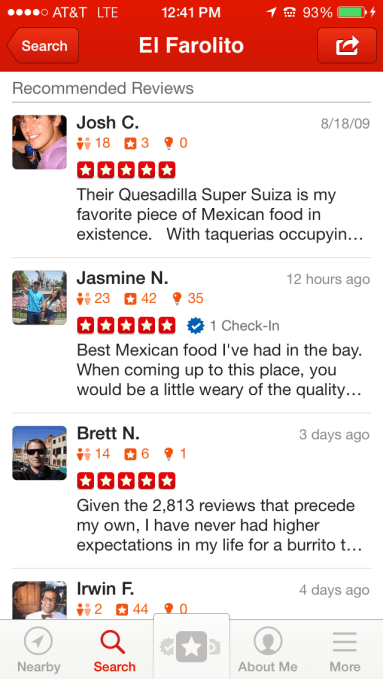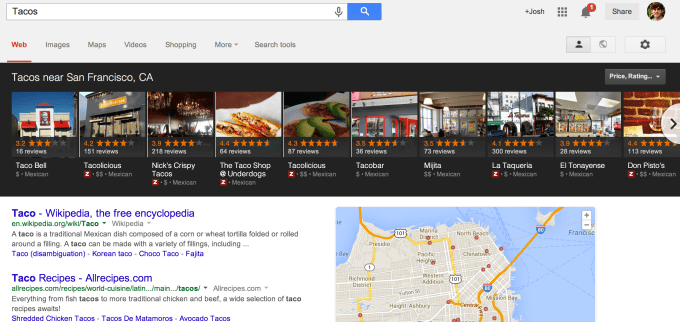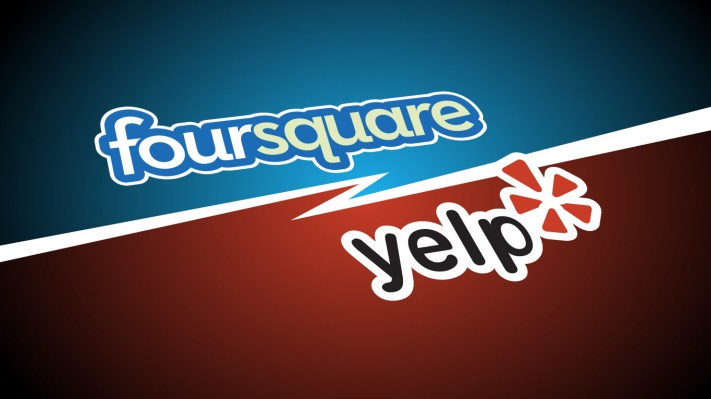Foursquare escalated its battle versus Yelp and Google today with a blog post explaining that its redesigned app will beat their “one-size-fits-all results” that users get “regardless of their interests or places they’ve been before”. Foursquare explains it transplanted checkins into its Swarm standalone app to let the forthcoming overhaul of its main app focus on local search, which it calls “fundamentally broken”.
Foursquare and Yelp have been throwing shade at each other for years, even though Dennis Crowley and his crew don’t name-check Yelp or Google here. Foursquare has ramped up its concentration on providing tips and restaurant dish recommendations, while Yelp has tried to become more social with checkins and more mobile with on-the-go reviews. Google meanwhile acquired Zagat to fill out its Places database, and now shows big rows of ratings or cards of info about local businesses in its search results.
[Disclosure: I advise a college friend’s stealth social location-sharing startup codenamed ‘Signal’ that is based in San Francisco. This advising role has been cleared with AOL and TechCrunch’s editors.]

After years of lying in wait, building its archive of geo-tagged knowledge, Foursquare is poised to go hard at local search this summer with a new interface for its main app.
Foursquare writes “We believe local search is fundamentally broken. Too many people are using antiquated tools to find places to go and getting the same one-size-fits-all results regardless of their interests or places they’ve been before. We’re reimagining Foursquare to provide people with the a whole new local discovery experience.”
Foursquare Personalized Tips vs Yelp Reviews vs Google Info
Who wins the battle may come down to what kind of format people prefer for local discovery guidance.
Foursquare centers around quick tidbits of information, like the best entrée at a restaurant or the prettiest part of a park you have to see. These are quick and easy to consume on mobile, and give answers into the question “Why should I or shouldn’t I go there?” But they’re also more subjective and present a less holistic view of a place.
 Yelp, on the other hand, will have to rely on its more familiar star-based rating system and comprehensive reviews. While it might not know as much about what you like, it knows a lot about the crowd thanks to years of popularity in a wide set of geographies. Yelp averages things out to give a more reliable assessment opposed to putting you at the whim of one user’s recommendation like Foursquare. Yelp’s long reviews may be tougher to read, but they can give you deep insight into the overall feeling of being somewhere.
Yelp, on the other hand, will have to rely on its more familiar star-based rating system and comprehensive reviews. While it might not know as much about what you like, it knows a lot about the crowd thanks to years of popularity in a wide set of geographies. Yelp averages things out to give a more reliable assessment opposed to putting you at the whim of one user’s recommendation like Foursquare. Yelp’s long reviews may be tougher to read, but they can give you deep insight into the overall feeling of being somewhere.
Google just wants to make things easy. Open the same search interface you use for everything else and it will recognize your queries as local-related and pop up basic information. If you want the hours, phone number, or address, Google will have it instantly. But try to dig deeper and you’ll find Google/Zagat’s reviews can be thin and vague. The company just hasn’t built a reputation as where local experts share their tips.

Foursquare’s not-so-secret weapon in the war on sounds like it will be personalization. The last line of the Foursquare post I quote above implies Yelp and Google only know what you search for, not where you go or what you love.
While Yelp has a large passive user base, only a fraction actually leave the long-winded reviews the service is known for. Similarly, you might use Google Search and Maps all the time without explicitly contributing. Their results don’t adapt. But thanks to Foursquare’s checkins and tips, and now Swarm’s always-on real-time location tracking, Foursquare can construct a deep profile of where you actually go to surface relevant recommendations.
Foursquare could win by providing personal recommendation for you and people like you by tallying the votes you cast with your feet.
